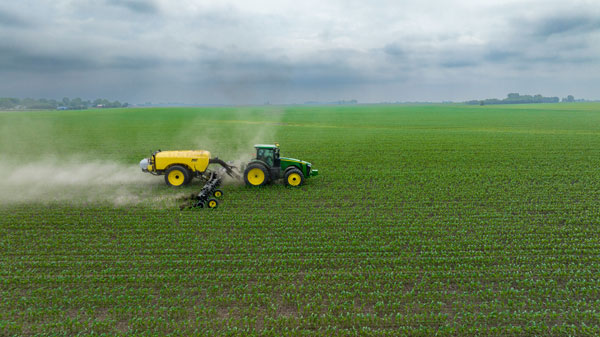MIT engineers unveil breakthrough coating shielding nitrogen-fixing bacteria

[A photo of sustainable agriculture. Photo Credit: Unsplash]
In a transformative leap towards sustainable agriculture, a team of researchers at the Massachusetts Institute of Technology (MIT) has introduced a groundbreaking metal-organic coating that promises to revolutionize farming practices.
Led by chemical engineer Ariel Furst, the team's innovation centers around a metal-phenol network (MPN) coating designed to shield nitrogen-fixing bacteria from environmental vulnerabilities, paving the way for the widespread adoption of microbial fertilizers.
The critical breakthrough addresses a longstanding challenge in utilizing nitrogen-fixing bacteria for agricultural purposes – their vulnerability to environmental stressors, particularly heat and the freeze-drying process essential for transportation.
The newly developed MPN coating acts as a protective shield, ensuring the viability and functionality of these indispensable bacteria, even under adverse conditions.
A standard feature of this cutting-edge coating is its ability to withstand temperatures as high as 132 degrees Fahrenheit (56 degrees Celsius) without the need for cold storage.
Additionally, the coating facilitates the conversion of the bacteria into a dried powder form, simplifying transportation and significantly reducing distribution costs.
This breakthrough not only democratizes microbial fertilizers for farmers but also marks a substantial step towards sustainable and cost-effective agricultural practices.
In their pursuit of an optimal protective coating, the research team experimented with various combinations of metals such as manganese, iron, aluminum, and zinc coupled with polyphenols like epigallocatechin gallate (EGCG).
These combinations created coatings tailored for nitrogen-fixing bacteria, particularly Pseudomonas Chlororaphis.
The resulting coatings proved highly effective in shielding the bacteria from extreme temperatures, humidity, and freeze-drying, ensuring their resilience and viability in agriculture.
Intriguingly, laboratory experiments with these coated bacteria revealed a remarkable 150 percent increase in seed germination rates across various seed types.
From dill to corn, radishes to bok choy, seeds treated with coated bacteria exhibited enhanced germination compared to untreated seeds or those treated with uncoated bacteria.
This promising outcome underscores the potential of MPN coating not just in safeguarding bacteria but also in positively influencing crop growth and seed germination.
The profound implications of this breakthrough have not gone unnoticed in the scientific community, leading to the establishment of Seia Bio, a company dedicated to commercializing these coated bacteria for widespread use in regenerative agriculture.
The company aims to make microbial fertilizers more accessible, particularly benefiting small-scale farmers who may have lacked the resources for large-scale microbial production.
Funding for this pioneering research came from various institutions, including the Army Research Office, the National Institutes of Health, the CIFAR Azrieli Global Scholars Program, and the MIT Climate and Sustainability Consortium.
These collaborations underscore the cross-disciplinary nature of the project and the shared commitment to advancing sustainable farming practices.
The potential to replace environmentally harmful chemical fertilizers with these coated bacteria signifies a crucial step in mitigating agriculture's environmental impact.
Beyond reducing reliance on chemical fertilizers, this innovation promises to promote soil health and enhance crop resilience, thereby contributing to a more sustainable and eco-friendly agricultural landscape.
As research progresses from laboratories to commercial applications, it opens up new avenues for addressing the global challenge of feeding a growing population while minimizing agriculture's environmental footprint.
The MIT-led breakthrough stands as a testament to the power of interdisciplinary collaboration and innovation in shaping a more sustainable future for agriculture.

- Seungmin Lee / Grade 11
- North London Collegiate School Jeju

![THE HERALD STUDENT REPORTERS [US]](/assets/images/logo_student_us.png)
![THE HERALD STUDENT REPORTERS [Canada]](/assets/images/logo_student_ca.png)
